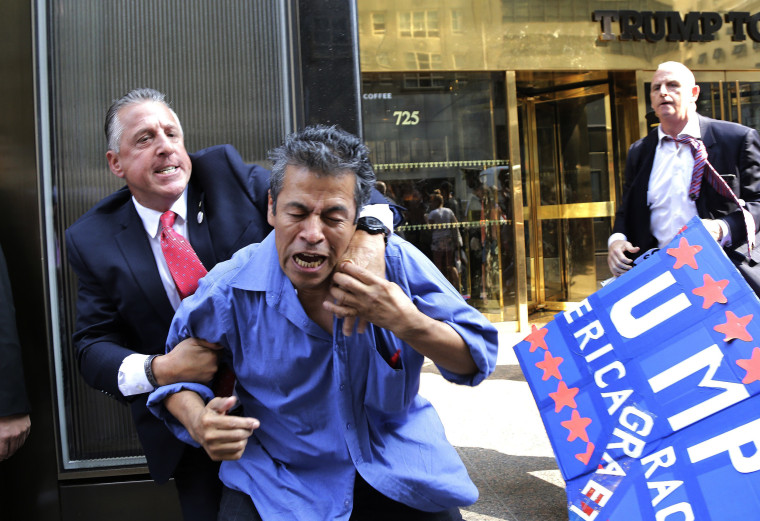Jury selection begins Monday in a civil trial for a group of protesters who are suing former President Donald Trump and his company over allegations that they were assaulted by security personnel outside Trump Tower in New York in 2015.
The trial will feature testimony from Trump — including his thoughts on the dangers of flying fruit.
Five protesters filed the suit against Trump, the Trump Organization and his presidential campaign in 2015 after they said they were roughed up outside of Trump Tower while protesting comments then-candidate Trump made about Mexicans.
"It has been seven long years of litigation, but our clients will have finally have an opportunity to present their case" to a jury, an attorney for the protesters, Benjamin Dictor, told NBC News.
Trump sat for a videotaped deposition in the case in October 2021, which will be played in court and will serve as his trial testimony.
Snippets released from the deposition in a court filing in April showed that Trump denied under oath knowing anything about the scuffle his security guards had with protesters.
That testimony was later refuted by former Trump lawyer Michael Cohen during his own videotaped deposition. Cohen testified in May that he witnessed Trump direct his bodyguard Keith Schiller to “get rid of” the protesters, and that Schiller later returned to Trump’s office with a sign he had taken from them, court filings show.
Like Trump, Cohen will not appear in person at the trial, but lawyers will play his four-hour videotaped deposition for the jury as his trial testimony.
In Trump's deposition, he defended comments he had made about protesters at rallies during his 2016 presidential campaign, including one in which he told attendees that “if you see someone getting ready to throw a tomato, just knock the crap out of them, would you?”
“It was very dangerous,” Trump testified when asked about the remarks, according to an April court filing. “They were going to throw fruit,” he said, calling it “very violent stuff.”
“It’s worse than tomato, it’s other things also. But tomato, when they start doing that stuff, it’s very dangerous,” Trump testified.
At one point, he said the 2016 remark to the crowd was made “sort of in jest” but then added that there was maybe “a little truth to it. It’s very dangerous stuff. You can get killed with those things.”
The protesters are seeking unspecified monetary damages for what they say were his security officers’ “wanton and malicious assaults and batteries.”
Trump defended Schiller in his deposition, saying, "He did nothing wrong. He went out — I didn’t know about it. But he went out, he heard there was a disturbance, and he went out. And he took a 50 cent sign down that was racist. He sees people dressed as Ku Klux Klansmen or whatever. People were probably complaining.”
Trump lawyer Alina Habba has also pushed back against Cohen's testimony in a court filing, calling him “a former disgruntled employee of the Trump Organization” with “a long and well-documented disdain for Mr. Trump” who “has publicly disparaged him on countless occasions.”
Jury selection is expected to take at least a week, as both sides look to find jurors who say they can be impartial in a case in which the defendant is the controversial former president.
The case is being heard in New York's Bronx County Supreme Court — about 10 miles north of the Manhattan courthouse where jury selection is already underway for a criminal tax fraud trial against the Trump Organization.
The company was indicted on tax charges last year after a yearslong investigation into its financial practices by the Manhattan district attorney’s office. The company, which has pleaded not guilty, faces up to $1.6 million in fines and penalties if convicted.
Trump and the Trump Organization were also hit last month with a civil suit by the New York attorney general's office alleging they had overstated the company’s financial assets by billions of dollars.
The suit seeks to impose about $250 million in penalties and to permanently bar Trump and his three oldest children from serving as officers of New York-based companies.
Trump has dismissed the suit as a politically motivated "witch hunt."

